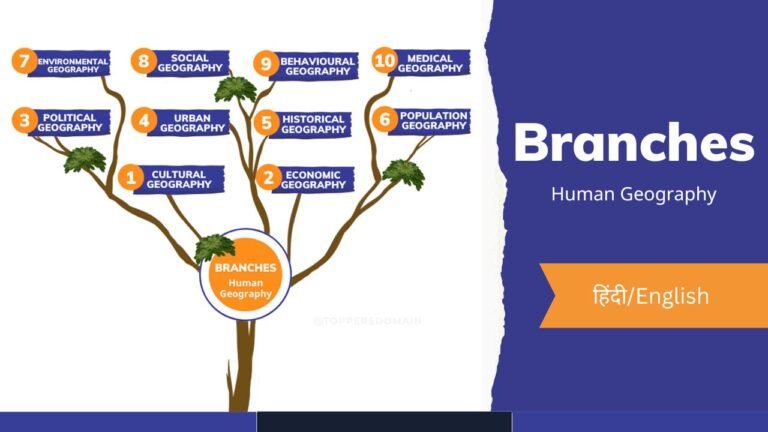Nature and Scope
Human Geography
Index
Nature and Scope of Human Geography
Human geography is one of the major branches of geography. It describes the adaptation or adjustment of humans with their natural environment. One side of its study covers man and his activities and the other side considers the impact of natural environment on man and his activities. Thus, to say that human geography is the study of human adaptation and adjustment with its physical and cultural environment. It deals with the study of the interrelationship of humans and nature or the relationship between humans and the environment, as well as the distribution of populations, cultures and economies in different regions and landscapes.
It is a unique field of knowledge as it provides spatial and temporal (changing over time) descriptions of various aspects of human activities and their effects on the environment.
Definition of Human Geography
Human geography can be defined as the study of the spatial organization of human beings and their interdependence with the physical, social and cultural environment.
Therefore, human geography is regarded as a bridge between the social sciences and the natural sciences, as it studies human activities (human behaviour) in the context of the relationship between man and nature (environment).
Nature of Human Geography
The field of study of human geography is extremely broad and diverse and it is constantly evolving. It involves the study of a wide range of subjects. Under this, topics such as population distribution and migration, cultural landscape, economy, urbanization and the impact of humans on the environment are included. It uses both qualitative and quantitative research methods to collect information and draw conclusions about human activities (and human behaviour) and their effects on the environment.
Human geography is an interdisciplinary study that draws on ideas (concepts) and methods used in various disciplines, including anthropology, sociology, economics and environmental science. This multidisciplinary approach enables human geographers to study human activities (and human behaviour) and the environment from a holistic perspective, taking into account the complex relationships established between humans and nature.
Field of Study of Human Geography
The field of study of human geography is broad and covers a wide range of subjects. The main areas of study in human geography are as follows:
Population distribution and migration: Human geographers study how the population is distributed in different regions. Geographers also studies how the process of migration and its pattern affect population distribution. Human geographers also study the social, cultural and economic factors that influence migration patterns.
Cultural landscape: Human geographers study the processes through which human cultures are formed or shaped by the physical environment. It includes the study of the man-made environment (cultural landscape), language, religion and other cultural aspects.
Economic Systems: Human geographers study the factors that influence human activities (and human behaviour). Geographers also study the patterns of production, consumption and trade and the impact of globalization on economic systems.
Political Geography: Human geographers study the processes by which political systems are created and how political systems affect the distribution of power and resources across the regions. It includes the study of borders, sovereignty and geopolitics.
Urbanization: Human geographers study the development of cities and urban areas, including the social, economic and environmental effects of urbanization.
Environmental Impact: Human geographers study the impact of human activity on the environment, including the effects of climate change, resource depletion and pollution.
Conclusion :
Ultimately, human geography is a fascinating and dynamic field of study that seeks to understand and explain the complex relationships between human activities (and human behaviour) and the environment. It studies a wide range of topics, including population distribution and migration, cultural landscapes, economic systems, political geography, urbanization and the impact of humans on the environment, among others.
Human geographers also study how people interact with each other and with their environment and how these interactions shape the environment in which we live.
Share
Other Topics
Unit - I





